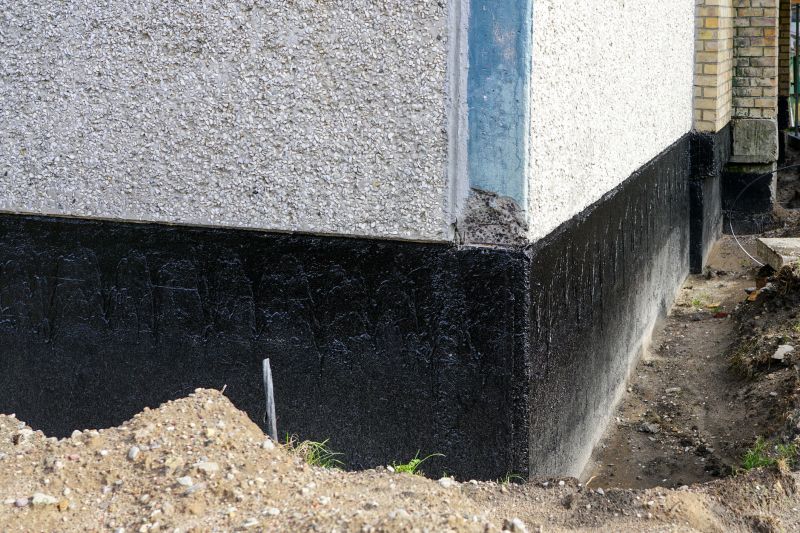Top Waterproofing Products to Protect Your Home and Foundation
Explore the leading waterproofing solutions that ensure durability, prevent leaks, and keep your property safe from water damage.
 Waterproofing products are essential solutions for protecting structures, foundations, and surfaces from water intrusion and damage. They come in various forms designed to suit different needs, whether for basements, roofs, walls, or outdoor surfaces. Proper application of these products can help prevent issues such as leaks, mold growth, and structural deterioration. When selecting waterproofing materials, it is important to consider the specific requirements of the project, including surface type, exposure conditions, and longevity expectations.
Waterproofing products are essential solutions for protecting structures, foundations, and surfaces from water intrusion and damage. They come in various forms designed to suit different needs, whether for basements, roofs, walls, or outdoor surfaces. Proper application of these products can help prevent issues such as leaks, mold growth, and structural deterioration. When selecting waterproofing materials, it is important to consider the specific requirements of the project, including surface type, exposure conditions, and longevity expectations.
Top Overall Option
Liquid Waterproofing Membrane
A versatile liquid membrane offers a seamless, flexible barrier suitable for various surfaces such as foundations, roofs, and walls. Its ease of application and adaptability make it a popular choice for many waterproofing projects. When properly applied, it can provide a durable layer that resists cracking and weathering, helping to protect structures from water infiltration over time.
Types of Products For Waterproofings
Liquid Waterproofing Membranes
Flexible liquid coatings that form a seamless barrier on surfaces like roofs and basements.
Bituminous Coatings
Thick, tar-like coatings ideal for underground and foundation waterproofing.
Rubberized Sealants
Elastomeric sealants used to fill cracks and seal joints effectively.
Polyurethane Coatings
Durable coatings suitable for roofs, decks, and surfaces exposed to weather.
Acrylic Waterproof Coatings
Water-based coatings that provide UV resistance and are easy to apply.
Cementitious Waterproofing
Ready-mixed cement-based products ideal for concrete surfaces and underground structures.
Sheet Membranes
Pre-formed sheets made of rubber or plastic for quick installation on large surfaces.
Spray-On Waterproof Coatings
Sprayed coatings that offer uniform coverage on complex surfaces.
Bitumen Sheets
Self-adhesive or torch-applied sheets for roofing and foundation waterproofing.
Flood Barriers
Temporary or permanent barriers designed to prevent water intrusion during flooding.
Waterproofing Tapes
Flexible tapes for sealing joints, cracks, and seams in various surfaces.
Crack Fillers
Specialized products for filling and sealing cracks in concrete and masonry.
Waterproofing Paints
Coatings that can be painted onto surfaces to add a waterproof layer.
Waterproofing Additives
Additives mixed into cement or plaster to enhance water resistance.
Drainage Boards
Protective layers that facilitate water drainage away from foundations.
Popular Choices
Widely used for their ease of application and seamless coverage, suitable for various surfaces.
Commonly selected for underground and foundation waterproofing due to their durability.
Popular for sealing cracks and joints in both indoor and outdoor applications.
Favored for their flexibility and weather resistance on roofs and decks.
Chosen for their UV resistance and ease of application on various surfaces.
Often used in basement and underground projects for their compatibility with concrete.
Preferred for large-scale projects requiring quick installation and reliable waterproofing.
Selected for complex geometries and detailed surfaces needing uniform coverage.
Commonly used in roofing and foundation applications for their proven performance.
Valued for sealing seams and cracks in plumbing, roofing, and masonry.
Popular for quick fixes and maintaining the integrity of concrete surfaces.
Easy-to-apply options for adding a waterproof layer to walls and ceilings.
Used to enhance the water resistance of cement and plaster mixes.
Many waterproofing products are formulated to provide a flexible, durable barrier that resists cracking and weathering over time. They can be applied as liquids, membranes, coatings, or sealants, each offering unique advantages depending on the application. For instance, liquid sealants are often used for cracks and small gaps, while membranes are suitable for larger surfaces requiring a continuous barrier.
In addition to traditional options, there are specialized products designed for particular environments, such as underground foundations or rooftop terraces. Proper surface preparation and application techniques are crucial for maximizing the effectiveness of waterproofing products. Regular maintenance and inspections can help ensure ongoing protection and identify potential issues before they escalate.
Choosing the right waterproofing solution involves understanding the specific conditions of the area to be protected. Factors such as exposure to water, temperature fluctuations, and surface material all influence the best product choice. Consulting with professionals or thoroughly researching product specifications can assist in making an informed decision, ensuring long-lasting results for your property in Bowie, MD.
Key Buying Considerations
- Surface compatibility: Ensure the product is suitable for the material you are waterproofing.
- Application method: Choose a product that matches your application skills and tools, such as brush, roller, or spray.
- Exposure conditions: Consider environmental factors like water exposure, UV rays, and temperature fluctuations.
- Durability: Look for products with specifications indicating long-lasting performance.
- Flexibility: Select coatings that can accommodate surface movements without cracking.
- Ease of application: Some products require professional installation, while others are DIY-friendly.
- Curing time: Be aware of drying and curing times to plan your project accordingly.
- Water resistance level: Ensure the product provides the level of water protection needed for your project.
- Compatibility with existing materials: Check if the product adheres well to surfaces like concrete, wood, or metal.
- Cost and coverage: Evaluate the cost per application area to determine value.
- Environmental conditions: Consider whether the product performs well in humid or freezing conditions.
- Maintenance needs: Some waterproofing solutions require periodic inspection or reapplication.
- Safety and handling: Review safety instructions, especially for chemical-based products.
- Warranty and manufacturer reputation: Research product reviews and manufacturer support for confidence in quality.
- Regulatory compliance: Ensure the product meets local building codes and standards.
